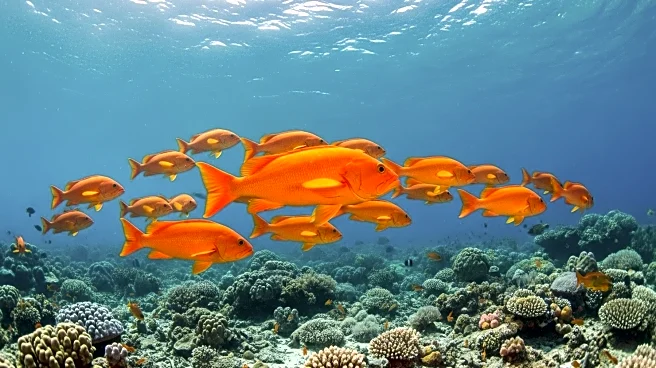What's Happening?
The Minister for Oceans and Fisheries in New Zealand, Shane Jones, has announced a significant reduction in the catch limits for orange roughy in the Chatham Rise, the country's most crucial fishing ground for this species. The new limit is set at 2,349 tonnes, a drastic cut from the 28,000 to 33,000 tonnes caught annually in the 1980s. This decision comes in response to the severe decline in orange roughy populations, particularly in the East and South Chatham Rise, where numbers have plummeted to about 10% of their original size. The Minister has also introduced 'spatial and temporal closures' of spawning areas to aid in the recovery of the fish population. Environmental groups have long advocated for the protection of seamounts, which are critical habitats for orange roughy and ancient deep-sea corals, from destructive bottom trawling practices.
Why It's Important?
This decision is pivotal for the sustainability of New Zealand's marine ecosystems and its international reputation. The orange roughy fishery has been criticized for unsustainable practices, leading to its red-listing by the Monterey Bay Aquarium's Seafood Watch program. The reduction in catch limits and protection of seamounts are seen as necessary steps to prevent further ecological damage and to restore fish populations. The move is also a response to public pressure, with over 100,000 people petitioning for the cessation of bottom trawling on seamounts. The fishing industry faces scrutiny as it has been accused of prioritizing short-term gains over long-term ocean health, risking both environmental and economic consequences.
What's Next?
The implementation of these new measures will likely lead to increased monitoring and enforcement to ensure compliance. Environmental groups, such as Greenpeace and the Deep Sea Conservation Coalition, are expected to continue advocating for the permanent protection of all seamounts from bottom trawling. The fishing industry may need to adapt to these changes by exploring more sustainable practices. The international market's response to New Zealand's fish exports, particularly concerning sustainability claims, will be closely watched. Further policy developments may arise as the government seeks to balance economic interests with environmental stewardship.
Beyond the Headlines
The decision highlights the broader ethical and environmental challenges of balancing economic activities with ecological preservation. It underscores the importance of treating the ocean as a complex ecosystem, where the protection of habitats like seamounts is crucial for biodiversity. The move may set a precedent for other countries facing similar challenges, potentially influencing global fisheries management practices. The cultural significance of marine conservation in New Zealand, a nation with strong ties to its natural environment, is also a critical aspect of this development.










